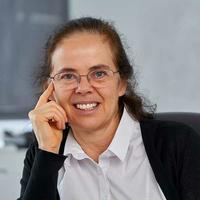Tardos gives Dean's Distinguished Lecture
The following day, she led a Q&A Panel on Networks, Crowd & Confusion; and Reasoning about a Complex, Highly Connected World; moderated by Mario Ventresca, assistant professor of industrial engineering. Other participating faculty panelists included Andrew Liu, associate professor of industrial engineering; Jennifer Neville, associate professor, and Mikhail Attallah, distinguished professor, both of computer science; and Seungyoon Lee, associate professor of communications.
"It was an interesting set of perspectives that primarily focused on the potential consequences and major challenges when using algorithms to reason and act within an increasingly connected world," said Ventresca.
ABSTRACT
Selfish behavior can often lead to suboptimal outcome for all participants, a phenomenon illustrated by many classical examples in game theory. Over the last decade we developed good understanding on how to quantify the impact of strategic user behavior on the overall performance in many games (including traffic routing as well as online auctions). In this talk we will focus on games where players use a form of learning that helps them adapt to the environment, and consider two closely related questions: What are broad classes of learning behaviors that guarantee high social welfare in games, and are these results robust to situations when game or the population of players is dynamically changing.
BIOGRAPHY
Eva Tardos is a Jacob Gould Schurman Professor of Computer Science at Cornell University, was Computer Science department chair 2006-2010. She received her BA and PhD from Eotvos University in Budapest. She joined the faculty at Cornell in 1989. Tardos's research interest is algorithms and algorithmic game theory. She is most known for her work on network-flow algorithms, approximation algorithms, and quantifying the efficiency of selfish routing. She has been elected to the National Academy of Engineering, the National Academy of Sciences, the American Academy of Arts and Sciences, and is an external member of the Hungarian Academy of Sciences. She is the recipient of a number of fellowships and awards including the Packard Fellowship, the Goedel Prize, Dantzig Prize, EATCS Prize, Fulkerson Prize, and the IEEE Technical Achievement Award. She is editor editor-in-Chief of the Journal of the ACM, and was editor in the past of several other journals including the SIAM Journal of Computing, and Combinatorica, served as problem committee member for many conferences, and was program committee chair for SODA '96, FOCS '05, and EC '13.

